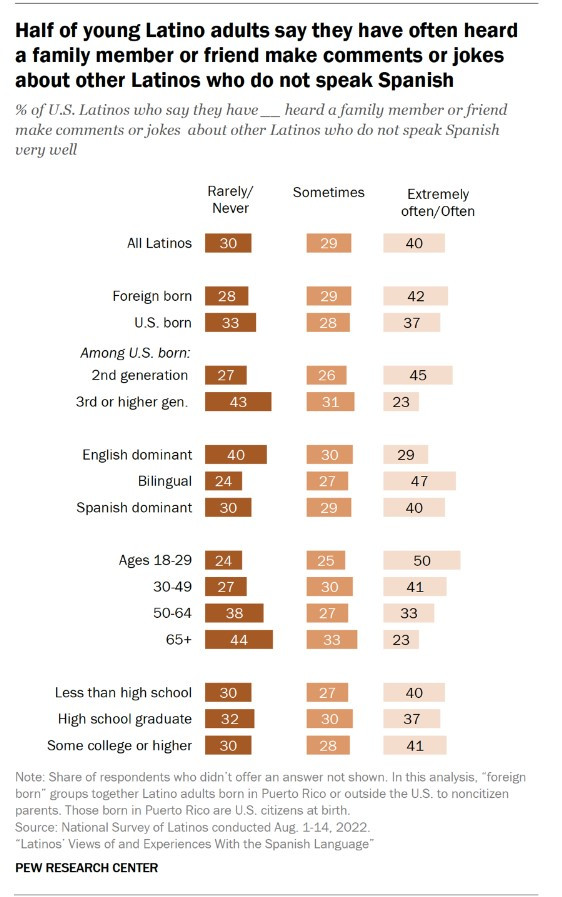
"No sabo kids," or Latinos who don't speak Spanish fluently, are shamed and made to feel bad by other Latinos, and some feel like it creates separation between Hispanics, new trends show.
"I just feel like "No Sabo kid" creates more separation between us. Can't we just be happy kinda knowing two languages?" Reddit user Late-Split-9091 said in the "Chicano" subreddit.
75% of U.S. Latinos say they can converse well in Spanish, but many first, second, third and many higher-generation Latinos don't speak Spanish well, and 8% of Latinos say they speak no Spanish, according to a study from Pew Research Center.
The study shows that 54% of Latinos/Hispanic/Latinx –these three terms are used interchangeably in the study– are shamed for not speaking Spanish. Additionally, the study found that one-fourth of Hispanics say they've heard other Hispanics joking about Latinos who do not speak Spanish or do not speak Spanish well. 40% of U.S. Latinos said they often or extremely often hear family and friends make jokes or comments about other Latinos who cannot speak Spanish.
Half of Hispanic adults between 18 to 29-years-old–the least likely group to speak Spanish–said it was extremely often that they heard jokes about Latinos who cannot speak Spanish. Meanwhile, 44% of Latinos ages 65 and older said they rarely hear jokes about Latinos who cannot speak Spanish.
There are also differences between countries of origin and the importance of speaking Spanish. According to the study, 79% of Hispanics with roots in Central America said it is extremely or very important for future generations of U.S. Hispanics to speak Spanish. In comparison, 64% of Mexicans and 58% of Puerto Ricans said the same. Similarly, 63% of Cubans said the same and 65% of South Americans said it is extremely or very important for future generations of U.S. Hispanics to speak Spanish.
The study cited Senator Marco Rubio's comment towards Senator Ted Cruz to highlight that shaming Latinos who don't speak Spanish is not new. During the 2016 presidential debates Rubio said Cruz doesn't speak Spanish. Cruz, whose father is Cuban, seemed offended by Rubio's comment and rebutted with, "If you want to say it right now, in Spanish if you want," Cruz said in Spanish.

Although some Latinos shame other Latinos who are not fully bilingual, the study shows that 63% of U.S. Hispanics report speaking Spanglish–intermixing English and Spanish words in sentences. The study also found that despite the shaming and intermixing of two languages, 78% of Latinos did not think speaking Spanish was necessary to be considered Latino.
30% of the Latino immigrants said speaking Spanish is necessary to be considered Latino. After them, 13% of U.S.-born Latinos say speaking Spanish is necessary to be considered Latino. 7% of third or higher-generation Latinos said speaking Spanish is necessary to be considered Latino. As a whole, 21% of all Latinos did not think speaking Spanish was necessary to be Latino.
Most Latinos said speaking Spanish is not necessary to be Latino, but 85% of all Latinos said it is somewhat, very, or extremely important that future Latino generations speak Spanish. Of all the groups of Latinos, Latino immigrants are the most likely to say it is extremely important for future Latino Generations to speak Spanish. In contrast, 25% of U.S.-born Latinos said the same.
© 2025 Latin Times. All rights reserved. Do not reproduce without permission.





